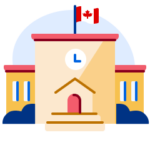Canada is one of the world’s top four study abroad countries, and it’s easy to see why. Home to some of the world’s top academic institutions, international students will love Canada’s competitive post-graduation work opportunities and its welcoming and inclusive environment.
International students also come to Canada because the country’s education system offers diverse and flexible post-secondary study options. Depending on which institution you attend and which program you take, you may graduate with a degree, a diploma, or a certificate. Read on to learn more about what each of these qualifications mean, and to help determine which study path matches your study abroad goals.
Not sure where you want to study abroad? All our destinations offer incredible opportunities, but learn why you should choose Canada for your international education.

Universities, Colleges, and Vocational Schools
One of the first things to consider when planning to study abroad in Canada is what type of institution you want to attend. There are three main kinds of postsecondary institutions in Canada:
- Universities: From small liberal arts universities to research-focused institutions, international students studying in Canada can choose the university that most closely aligns with their goals. Universities offer bachelor’s degrees, master’s degrees, and doctorate degrees (PhDs) that are respected and recognized around the world.
- Colleges: Colleges offer a hands-on, technical education to give students the skills they need to excel in a specialized field. With smaller class sizes, students can get more one-to-one time with their instructors.
- Vocational Schools: Vocational schools offer job-ready programs designed to prepare students for success in a specific occupation. These schools may also be known as career, technical, or trade schools.

Degrees vs Diplomas vs Certificates
Choosing the right study program includes understanding what type of qualification you’ll graduate with. Certain qualifications take more time to achieve, and if you’re planning to continue your studies after you graduate, it’s important to plan out your entire education path. Regardless of what you choose, Canadian post-secondary qualifications are recognized around the world!
Degrees
Most degrees in Canada are earned through studying at the university level. However, some Canadian colleges also offer bachelor’s degrees. In all, there are four types of degrees, though associate’s degrees are often grouped together with bachelor’s degrees.
Bachelor’s Degree
A bachelor’s degree is a foundational qualification that can lead to a range of careers or further education opportunities. Most Canadian bachelor’s degrees require four years of full-time study, although there are some bachelor’s programs with a duration of three years, and there are also two-year associate’s degrees. Bachelor’s programs in Canada always require in-class studies, but may also include a final project or paper before graduation.
- Length: 3 to 4 years
- Study level: undergraduate
- Academic prerequisites: high school diploma (or equivalent)
- Offered by: Canadian universities and some colleges
Graduates who earn a bachelor’s degree from either a Canadian university or college may be eligible for a Post-Graduation Work Permit (PGWP) without field of study limitations.
Master’s Degree
Students looking to further their education can pursue a master’s degree after they finish their bachelor’s degree, for added specialization in their field of study. In many careers, a master’s degree can help graduates attain higher-earning positions or leadership roles. A master’s degree can be course-based, like a Master of Business Administration (MBA), or research-based.
- Length: 1 to 2 years
- Study level: graduate
- Academic prerequisites: a bachelor’s degree
- Offered by: Canadian universities
Doctorate/PhD
After earning their master’s degree, some students may decide to complete a doctorate degree or PhD. The most well-known doctorate is a PhD. Doctorate degrees are the highest level of education in Canada and at most universities around the world. These programs are usually research-based and students will need to secure a research supervisor at their chosen university.
- Length: 3 to 7 years
- Study level: graduate
- Academic prerequisites: a master’s degree
- Offered by: Canadian universities

Diplomas
When it comes to diploma programs in Canada, some students may wonder: Is a diploma an undergraduate degree? Is a diploma even considered a degree? Why should I consider a diploma vs. a bachelor’s degree?
Diplomas are not the same as degrees. Diplomas set students up for success in a specific field or occupation, and they often take less time to earn than degrees. They also often offer more hands-on learning than more research-focused degrees.
Most diplomas are offered at the college level, though some universities offer diploma programs as well, especially at the postgraduate level. When considering whether to apply for a degree program or a diploma program, consider your career goals and how much access to hands-on experience in your field matters to your career growth.
There are three types of diplomas a student can earn in Canada:
Regular Diploma
A regular diploma provides students with a base level of knowledge and skill in their chosen field of study. It can help students learn about a specific profession, and sometimes includes a work placement like an internship.
- Length: 1 to 2 years
- Study level: undergraduate
- Academic prerequisites: high school diploma (or equivalent)
- Offered by: Canadian colleges (and some universities)
Advanced Diploma
An advanced diploma includes an additional year of study, which allows its coursework to be more specialized than a regular diploma. Advanced diplomas often (but not always) include a co-op or internship. These diplomas can also be a pathway to enrolling in a bachelor’s degree, as many universities offer college-to-university programs for advanced diploma graduates.
- Length: 3 years
- Study level: undergraduate
- Academic prerequisites: high school diploma (or equivalent)
- Offered by: Canadian colleges (and some universities)
Many Canadian college programs lead to in-demand careers in growing industries. Learn more about skilled trades programs in Canada.
Graduate or Postgraduate Diploma
Students can pursue a graduate diploma (sometimes called a postgraduate diploma) after completing a regular or advanced diploma, or a bachelor’s degree. A graduate diploma offers students a combination of classroom training and hands-on experience. Graduate diplomas are popular among professionals looking to expand their skills, advance their careers, and broaden their understanding of their chosen field.
- Length: 1 to 2 years
- Study level: graduate
- Academic prerequisites: regular/advanced diploma or a bachelor’s degree
- Offered by: Canadian colleges and universities
Certificates
Certificate programs are often the shortest type of post-secondary education in Canada. Sometimes also known as “micro-credentials”, many students enrol in certificate programs for professional development, to earn a professional certification (required in some careers), or to build on a previously earned credential.
- Length: usually less than 1 year
- Study level: undergraduate
- Academic prerequisites: varies, but typically at least a high school diploma
- Offered by: Canadian universities, colleges, and vocational schools
Whether you choose a short micro-credential program, or dive into a degree, your study abroad future in Canada is waiting. Here’s to taking your next step!
Ready to start your study abroad adventure in Canada? Explore top programs using our free ApplyBoard platform!



